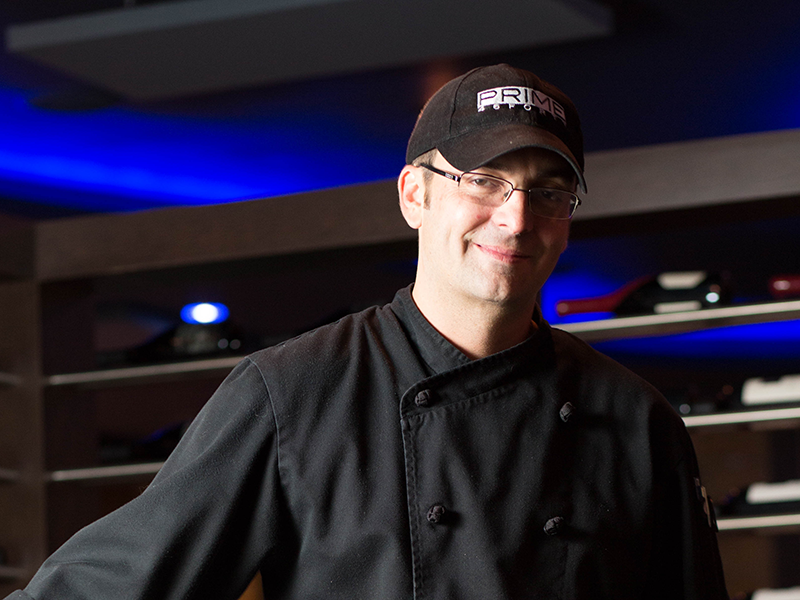Chef Tim Westby-Gibson is the king of the kitchen at Prime46forty in Williamsburg, Virginia. Sporting an ecclectic and delicious menu filled with fresh, seasonal ingredients, Westby-Gibson dishes on where to find the best ingredients, order wild game and what’s on his menu this fall.
How did you become a chef?
I started washing dishes at The Trellis in 1994. I worked my way up to sauté cook and was able to work under some very good chefs there. I’m originally from South Florida and I went back there for a while and worked under good chefs. I came back here and I’ve worked at several area restaurants. I spent a year as an accountant at Powhatan Plantation. After about three weeks of working 9 to 5, I got a night job in a kitchen. I worked at A. Carroll’s Bistro—Carroll Bull, my partner here was the owner. I was moonlighting while I was an accountant, making salads and stuff at night helping out my friend who was working there. She lost her chef and offered me the position. I took it over. I was 22 years old and I haven’t looked back since.
With the holidays coming, what delicious, seasonal ingredients do you recommend?
Well this season is obviously great for fall, autumn and winter squashes. Butternut squash, acorn squash, spaghetti squash, as well as some of the heirloom varieties. There are all kinds of winter squashes that are locally grown and produced yet under-utilized. They’re all organic and sustainable.
Obviously, root vegetables in the fall and the winter are the biggest things—rutabagas, parsnips, celery root, mushrooms. A lot of mushrooms will be in season through the holidays. Fresh porcini mushrooms, chanterelle, royal trumpets. You can get them online. You can get cultivated mushrooms, like oyster mushrooms and shittake mushrooms, locally from farmers.
Wild game is obviously one of the biggest ingredients in the fall—venison, wild boar, elk, as well as game birds like quail, pheasant, guinea hens and squabs. Those are some of the ingredients we’ll also focus on for our fall and winter menu.
There are also braising greens—tuscan, kale, mustard greens—several varieties of chard—Italian shard, rainbow shard—as well as flowering cruciferous vegetables like broccoli, cauliflower, romanseco and kohlrabi. Those are great ingredients to have throughout the winter.
Can you get wild game in Hampton Roads?
You won’t find anything that’s locally gown and USDA processed. That’s the biggest thing. You have to find something that has been processed and inspected by the USDA so you know it’s safe to eat and not just from somebody’s backyard. You want to find a reputable source, preferably online, because most game is going to come from places like Texas or somewhere in the Midwest. We use Broken Arrow Ranch out of Texas. They do several different kinds of venison, as well as antelope and quail. D’Artagnan is an online purveyor that can ship everything to you FedEx. They can get anything you can think of. There is another company called Broadleaf in California and they import game from New Zealand and Australia and ship it overnight so you can have it at your door the next day.
Where can I get fresh ingredients?
Your local Farmers’ Market. They won’t run all winter long, but some of the farmers are part of co-ops, so you can get on a plan with them and once a week or once a month they can send you a box of what they have available. So in the summer, you get tomatoes; in the spring, you get berries; and in the winter, you get squashes and root vegetables. Some of the grocery stores do a good job of getting local produce. I know Harris Teeter and Farm Fresh try to find local farmers to supply their produce. But there is no substitute for meeting a farmer.
Let’s talk pairings. What’s good?
We have beautiful fresh figs in. We’re getting quail in from Broken Arrow Ranch. So I’m pairing quail with fresh black mission figs and making a sauce out of the quail stock. We infuse that with the flavor of the fresh figs and I’ll grill some of the figs and garnish the plate with them. So the whole dish takes on the flavor of those fresh figs, which is beautiful.
Some of the winter squashes go well with venison. Venison is a very lean red meat. It has almost a sweet inherent quality to it which is very nice. So pairing some of those sweeter squashes with the venison, and adding some spice to it, goes very well together.
I have a thing for pastas, too, so we make all kinds of raviolis and fresh pastas. The winter squashes go fantastic with that. Right now we do a roasted sweet potato ravioli. We also do butternut squash ravioli. We do a grilled flatbread and top it with Kabocha squash.
And right now I also have a roasted butternut squash and local apple soup. Everything I put in the soups are grown within 30 miles of here which is fantastic.
How do you do your menu planning for Prime 46FORTY?
The biggest thing I do is talk to the farmers that supply me. I ask what they’ll have available. Growing seasons in Virginia tend to be a little different from year-to-year depending on how the weather was. Last year, we had a very cold winter so a lot of the spring crops came in late. We had a very hot summer for a little while, but it ended very quickly. So in September, the temperature cooled off and we got a lot more rain so tomatoes ended very quickly as opposed to last year I had tomatoes going through the end of October. So I talk to my farmers and they tell me what they have planted, when they expect it to be coming up, what’s already coming up and what’s already looking good. That helps me forecast for the next 3-4 months.

